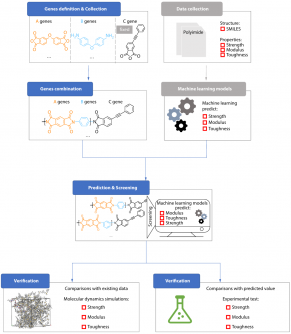Top Stories
AI Breakthrough Accelerates Design of Superior Polyimide Films

UPDATE: A groundbreaking study has just confirmed a revolutionary AI-driven strategy that is set to transform the design of ultra-tough polyimide films. Published online on September 2, 2025, in the Chinese Journal of Polymer Science, this research from the East China University of Science and Technology promises to accelerate the development of high-performance materials crucial for aerospace, flexible electronics, and micro-display technologies.
Polyimide films are vital for their thermal stability and insulation properties, yet achieving the right balance of mechanical optimization has proven challenging. Traditional methods often lead to trade-offs where enhancing one property diminishes another. The new AI-assisted materials-genome approach (MGA) offers a solution that integrates computation, experimental data, and artificial intelligence to streamline the design process.
The study introduces an innovative machine-learning model capable of predicting three essential mechanical parameters—Young’s modulus, tensile strength, and elongation at break—across over 1,720 candidate structures. This approach has successfully identified a new formulation, PPI-TB, which outperforms established benchmark polyimides.
The research team utilized Gaussian process regression (GPR) models trained on more than 120 experimental datasets, achieving impressive predictive accuracy with R² values between 0.70 and 0.74. Their findings indicate that PPI-TB exhibits a modulus of 3.48 GPa, showcasing superior toughness and strength compared to existing systems like PETI-1 and O-O-3.
Subsequent molecular dynamics simulations confirmed the strong correlation between predicted and actual performance metrics. The study also unveiled critical design principles: the incorporation of conjugated aromatic structures enhances stiffness, while flexible silicon- or sulfur-containing units improve elongation capabilities.
Prof. Li-Quan Wang, a leading researcher on the project, stated,
“By translating polymer fragments into genetic-like descriptors, we can treat molecular design like decoding a genome. This synergy between data science and chemistry allows us to explore material possibilities that would take decades by conventional means.”
This AI-driven strategy is not just a significant leap for polyimides; it establishes a scalable framework applicable to various high-performance polymer classes. The implications extend to developing lightweight, durable, and thermally stable materials essential for the future of electronic and aerospace technologies.
The success of the PPI-TB formulation exemplifies how machine learning can redefine the material discovery process, drastically reducing costs and development time by replacing years of experimental iteration with predictive modeling and virtual screening.
With funding from the National Key R&D Program of China (No. 2022YFB3707302) and the National Natural Science Foundation of China, this study marks a pivotal moment in polymer engineering. As industries increasingly adopt AI technologies, the potential for innovation in materials science is rapidly expanding.
Stay tuned for further updates as the research community explores the vast possibilities opened by this novel approach to polymer design. This development not only signals a promising future for high-temperature polymers but also highlights the crucial intersection of AI and chemistry in shaping next-generation materials.
-

 World2 weeks ago
World2 weeks agoGlobal Air Forces Ranked by Annual Defense Budgets in 2025
-

 World2 weeks ago
World2 weeks agoMass Production of F-35 Fighter Jet Drives Down Costs
-

 Top Stories2 weeks ago
Top Stories2 weeks agoDirecTV to Launch AI-Driven Ads with User Likenesses in 2026
-

 Top Stories2 weeks ago
Top Stories2 weeks agoNew ‘Star Trek: Voyager’ Game Demo Released, Players Test Limits
-

 Science2 weeks ago
Science2 weeks agoTime Crystals Revolutionize Quantum Computing Potential
-

 Entertainment2 weeks ago
Entertainment2 weeks agoFreeport Art Gallery Transforms Waste into Creative Masterpieces
-

 Lifestyle2 weeks ago
Lifestyle2 weeks agoDiscover Reese Witherspoon’s Chic Dining Room Style for Under $25
-

 World2 weeks ago
World2 weeks agoElectrification Challenges Demand Advanced Multiphysics Modeling
-

 Lifestyle2 weeks ago
Lifestyle2 weeks agoLia Thomas Honored with ‘Voice of Inspiration’ Award at Dodgers Event
-

 Health2 weeks ago
Health2 weeks agoGavin Newsom Critiques Trump’s Health and National Guard Plans
-

 Entertainment2 weeks ago
Entertainment2 weeks agoFast & Furious Coaster Hits the Track at Universal Studios
-

 Health2 weeks ago
Health2 weeks agoResearchers Uncover New Insights into Cancer Mortality Causes









